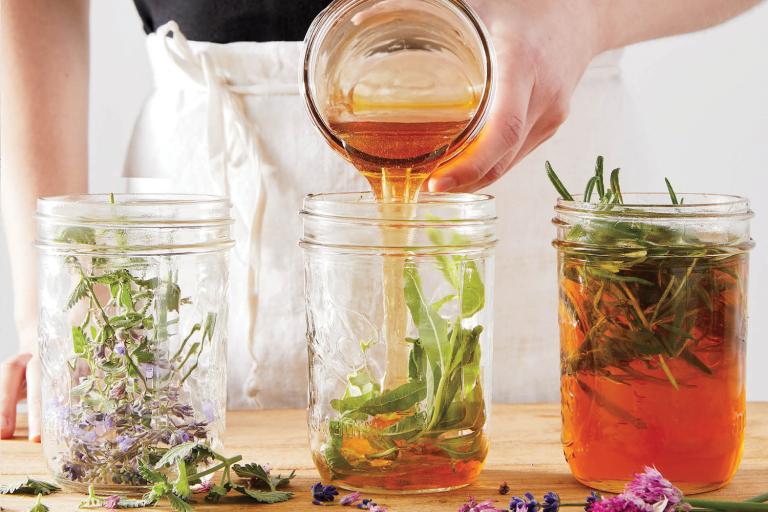There are several different types of preparations that combine honey and herbs in a synergistic way. Some herbs are better in certain preparations in order to optimally deliver their therapeutic properties.
Herbal Preparations with Honey
-
Honey Electuaries
Electuaries are mixtures of raw honey with anything intended to promote healthy balance or benefit in the body. In modern times, this process has been used in veterinary medicine, particularly with horses, but it has a long history with humans as well.
The electuary is mixed using raw honey and dried or fresh plant material as a base to which many other healing aids may be added. Electuaries are eaten by the teaspoonful and are intended to be delicious, making often bitter or unpalatable herbs more agreeable to use in daily life.
-
Honey Infusions
Infusions are created by adding fresh herbs or spices to raw honey and allowing them to steep. There is no heat added in the process. Instead, infusions are stirred regularly and may be kept in sunlight for at least two weeks and up to six weeks to allow the flavor and the benefit of the plant to be transferred into the honey. At the end of this period, the herbs or spices are strained out. The enhanced honey is then left to be eaten on its own or added into recipes.
-
Honey Tinctures
Tincturing is a similar process to infusion but with the addition of alcohol or vinegar to the honey, herbs, and spices. No heat is applied. The mixture sits and is blended by frequent stirring over the course of four to six weeks. When time is up, the tincture is strained, the herbs are composted, and the resulting liquid is used in 30- to 60-drop amounts (dosage varies by herb).
-
Honey Pian
Pian is a Chinese word for “slices,” which is how pills were originally made. To make these pills, powdered herbs or spices are combined with raw honey to form a dough. The dough is sliced into small bits and rolled to the size and shape of a pea. They are eaten fresh or dried.
-
Honey Fermentation
Fermenting is the process of allowing the natural yeasts in honey to eat away at the sugar content and produce various levels of alcohol and probiotics. Fermented honeys can be amplified by adding healthful herbs, spices, or symbiotic organisms such as Jun. The resulting beverage or food is eaten and enjoyed to improve digestive health.
-
Honey Oxymel
An oxymel is a blend of honey and vinegar, enhanced with an herb or herbs for the purpose of healing the body. The blend has been used throughout history as a vehicle for delivering herbs that some find unpleasant on their own. They can be enjoyed by the glass or blended into other recipes.
Making Oxymels
The word oxymel comes from the Latin oxymeli meaning “acid and honey.” Apple cider vinegar is a well-known ingredient for making an oxymel, but there is room for experimentation, like using kombucha.
Today, oxymels are popular drinks for health, like the common apple cider vinegar–honey-cayenne-lemon mixture, and even as cocktails with a sweet-and-sour punch and often a savory herbal flavor infused throughout.
The Fast Way to Make an Oxymel
- Start with 1/2 cup to a half-pint jar of your favorite herbal-infused honey. Add to 1/2 cup apple cider vinegar. Stir.
- Enjoy your oxymel with a bit of sparkling water or store it to enjoy by the spoonful. To make a refreshing drink, add 1/4 cup oxymel to 1/4 cup sparkling water or adjust to your taste. If you are storing this oxymel, be sure to use a plastic lid for your canning jar. Vinegar will corrode a metal lid.

